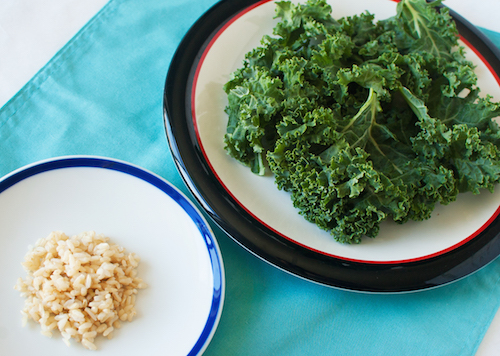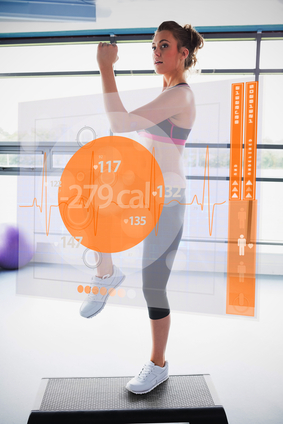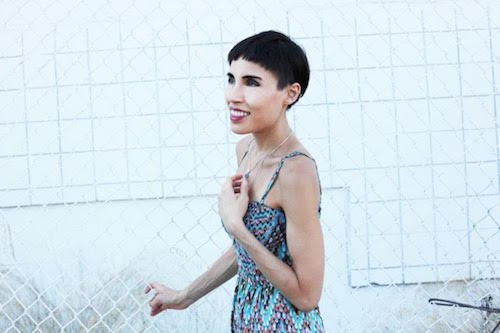Why isn't weight loss happening?
Every week I still get an email or I see a comment on Facebook a lot like this one:
"I keep hearing about how everyone loses weight going plant-based, but I haven't lost a pound!"
or
"I went vegan and I GAINED weight"

For some, the weight falls off at first then slows. For others, the weight never budged and some people experience weight gain.
Back to the topic at hand: Why isn't weight loss happening?
Through Happy Herbivore and the meal plan service, plus all the years I was a personal trainer, I've found weight gain (or lack of weight loss) tends to come back to diet more than anything. Exercise can help, but it almost always comes back to diet.
When I was a personal trainer, I had two clients who insisted it didn't matter "what" they ate, as long as they didn't go over a set number of calories. They trained hard, worked out 5-6x a week, scrupulously counted calories and nada. When the weight wouldn't budge, they set their calorie limit even lower. Still nada. Finally they tried my meal plan, which was full of healthy foods, and ta-da!
This is anecdotal evidence at best, I know — but my point is, when it comes to weight loss, in nearly every instance of every person I've ever worked with or talked to, it was diet that was the problem (or the solution) — not more exercise. Many of my clients don't exercise at all, and they are still losing.
In fact, just last week, I was talking to Dustin who sadly has a broken foot. Even though Dustin lost some of his mobility (and can't, say, go for a run), he's not gaining back any of the weight he lost. He thanks and attributes that to his plant-based diet.
So yes, "diet" is the key — but when I say "diet," I mean the food you eat, not diet as in restriction or deprivation a la the cabbage soup "diet."
If you've been using the meal plans, but have not been losing weight it's time to surrender.
Your way has not been working.
Your goal is to only eat from the meal plans for the next week. I guarantee if you only eat from the meal plans, and nothing else you will have success. That means no wine, no nuts, no extra little treats.
Removing Bad Foods is Easier Than Changing Habits
Lets face reality, it's easier to stop drink wine every night, than to start a 5 A.M. workout habit.
Over the years, I've found the same dozen or so culprits (most of which are "food," but some are behaviors) that cause my clients to gain weight or slow their weight loss. In just about every instance, once the "culprits" were removed, the scale started moving again.
1.
Oil. If you're not oil-free, that's your culprit. Even if you think you're oil-free, make sure you really are 100%. You'd be surprised how often oil sneaks into foods. Even foods that you expect to be oil-free like mustard, vegetable broth or hot sauce, can have oil. Check all your condiments. Check all your breads, crackers, etc. Anything that you didn't make yourself, check. Oil can even sneak into non-dairy milk.
2.
"Vegan" Foods. Most vegan substitutes (i.e., faux meats, faux cheese) are junky and not healthy (and most contain oil). Make sure you're not eating vegan convenience foods if you're trying to lose weight. Just because something is "vegan" doesn't mean it's healthy. Oreos, Ritz crackers, French fries, Daiya cheese, Coconut Bliss ice cream — all vegan, but they won't help you lose weight. Also be weary of some non-dairy milks, as many contain oil. Also try to buy unsweetened "milks" if you can, and steer clear of flavored milks like chocolate soy milk. That's a candy bar in a glass.

3.
High-Fat Plant Foods. Don't get me wrong, I love avocado and guacamole from time to time, but if you're eating high fat plant foods regularly, this is your likely culprit. As Dr. McDougall says, "The fat you eat is the fat you wear." If you're trying to lose weight, limit tofu, tempeh, avocado, nuts, seeds, coconut milk, coconut, nut butters (i.e., almond butter and peanut butter), chocolate, and olives. These foods should be used sparingly, as a condiment (i.e., sprinkle a few seeds on a salad) or a treat. I went on an avocado bender a few summers ago and was shocked how fast the weight crept back on.
4.
Caloric Density. The bulk of your meals should be made from foods lower in caloric density that are satiating. Main food staples should be grains and starches, vegetables (particularly green vegetables), beans and fruit.
5.
Salt. While I follow the advice of Dr. McDougall, who says a little salt is okay to make things palatable; salt can sneak into a lot of plant foods and then you're consuming too much. For example, canned beans and vegetable broth can have unruly amounts of salt. According to Jeff Novick, MS RD, salt should be a 1:1 ratio with calories in a prepackaged food. For example, if something contains 100 calories per serving, there should be no more than 100 mg of sodium per serving. Lastly, if you must salt your food, add salt AFTER you finish. Do not add salt during cooking.
6.
Drinking calories. Chewing is a very important part of digestion and helps slow you down. I can slurp down a 500-calorie drink and be ready for more, but I can't chew 500 calories worth of foods that fast. Chances are, I'd be stuffed afterward if I could even make it through all those foods. Drinking calories doesn't provide the same satiety as chewed whole foods. Use your teeth like nature intended :)
7.
Alcohol. I'm not saying to never have a drink, but cut back on drinking as much as possible if you're trying to lose weight. (Remember, try not to drink your calories). A glass of wine here and there isn't the problem, it's the 3 glasses of wine or the wine nearly every night. I find wine and cocktails are the biggest culprit after oil and added fats (like nuts or avocado) with my clients.
8.
Eating Out. Even if you're ordering a vegan meal, most restaurants overload their food with salt, sugar and oil. If you're trying to lose weight, be diligent about ordering healthy, oil-free fare such as steamed vegetables and rice or a salad with fresh lemon juice (instead of dressing). If the food comes out shiny and oily, send it back. If you want to be "social," why not host a dinner party or potluck instead?
9.
Fiber-Broken Foods. First, make sure the bread, pasta and crackers you buy are 100% whole-wheat (or gluten-free) and oil free. Second, don't base your diet around these foods. You want to go for whole grains like brown rice and quinoa or whole-wheat couscous over the more processed version. Carbs don't make you fat, but the more whole, the better. If you do decide to eat pasta, make sure it's a lot of vegetables with some pasta.

10. Dried fruits. First, you want to make sure your dried fruit is just dried fruit — no added oil or sugar. Second, as with the high-fat plant foods, you want to limit dried fruits. A few raisins sprinkled in your oatmeal is fine, but don't eat handfuls of raisins or dehydrated apples as a snack. Eat apples and grapes instead. Dried fruits are very calorically dense and not very satiating. Eat the "fresh" version instead, using dried fruits as a condiment only.
11. Coffee. Caffeine use is your business, but if you must drink coffee, drink it black. Sugar and creamer (even vegan creamers) can turn a latte into a hot, drinkable candy bar. I'm often shocked by the amount of calories and fat in coffee drinks at Starbucks. Even if you skip the fancy drink, "homemade" can get you if you're not careful. If you put just 1 tablespoon of sugar in your coffee each morning you'll have consumed nearly 23 additional cups of sugar in one year. That's a lot of sugar and a lot of calories!
12. Mindless eating. I could write 10 blog posts on this topic. The short of it: Start keeping a journal to really see how much you eat in a day or use a phone app such as My Fitness Pal or Livestrong Daily Plate. Or just take a picture of everything you eat. If you work in an office, you might be surprised how often you dip your hand into the candy jar. If you're the cook at home, you'll be surprised how much you eat "tasting" your food while it's cooking. I'm terrible at nibbling while cooking. A lot of foods sneak in each day that we don't think about and that can be a huge culprit. Also, never leave food on the table. Leave it in the kitchen so you have to get up if you want seconds and always put your snacks in a bowl — don't eat out of the bag or you'll mindlessly munch.
13. Overeating. Many of the plant-based experts say: “You can eat as much as you want. As long as it's plant foods, especially whole foods close to nature. Don't count calories.” But for some people's biological needs, it doesn't work. It's important to eat whole foods, but I don’t think that plant foods have “magic calories” that don’t count. All foods, even kale and bananas and rice, contain a little fat naturally. And if you're overeating, that fat is going to add up. Excess is still excess. I wasn't able to break my weight-loss barrier (and maintain it for TWO YEARS) until I started using the meal plans consistently. (You can read more of my story here.) Science has PROVEN the body reacts differently to different types of calories. The source of the calorie matters most!
Why exercise doesn't help you lose weight

I received this email recently, from a woman wanting to know if the meal plans can help her. (yes! absolutely!)
"I have followed the plant-based diet for the last two years and love the way I feel. I have lost 80 pounds so far but I am stuck. For the last month I have greatly restricted my caloric intake. I am also exercising daily but my weight hasn't budged for a month!"
First a big congrats on the weight loss! That's amazing!!
Second, as I have found with many of my clients, caloric restriction in and of itself is not always enough. It depends on WHAT more than total calories. (*I found this particularly true as my clients started reaching their goal weights (less than 25 lbs to go).
For example, I've had clients who insisted they could eat "whatever they wanted" as long as they stuck to a certain caloric budget. Sometimes this worked initially but it always faltered in the end. They had to clean up their diet to get results.
Eating plant-based can have it's traps, too. For example, eating too many fats like nuts and seeds can inhibit weight loss even when you're counting calories. (See: Not Losing Weight on a Plant-Based Diet? Here's Why).
Third, if you're exercising and greatly restricting your calories, that could be the problem. When I was a personal trainer, I found the heavy restriction + exercise combo often slowed my client's losses (and that also led to them not feeling their best).
If my clients insisted on heavily restricting their calories, I generally advised them not to "exercise" (only walk). Once they achieved a desired weight/body fat loss, and they were willing to stop restricting, then we brought exercise back in.
Exercise is great, but it's not required for weight loss. It also requires more of a juggling act than if you try to lose based on diet alone. If you want to exercise, by all means do, but make sure you're eating enough and be careful not to deplete your glycogen.
Exercise is great, but it's not required for weight loss.
I also do not recommend daily exercise. Any trainer will tell you working out every day is too much unless it's light activity like walking or gentle yoga.
Lastly, remember that the scale is not the best method for tracking losses. You could be gaining muscle in addition to fat loss from all that exercise, in which the scale won't move down. (Related: What Weighs More: A Pound of Fat or a Pound of Muscle (& Why the Scale is a Frenemy)).
The meal plans make it so easy and I'm thrilled to have so many success stories.
For those looking to lose weight, stick to the meal plan as close as possible and choose the lower fat options!
Hear Success Stories from Members Just Like You
It's easier to relate to people that have experienced the same setbacks and health problems you have. Which is why we record interviews with your fellow members in the Meal Mentor community.

Herbie of the Week
Most commonly, we hear about individuals who went plant-based and lost 20, 40, 60... or even 100 lbs. or more. These amazing individuals (and their inspiring accomplishments) are highlighted each week on Happy Herbivore as part of our "Herbies of the Week" series.
Meal Mentor Podcast
Lindsay also hosts a weekly podcast where she interviews members who share all the same struggles you have and you can listen online or subscribe with iTunes.
